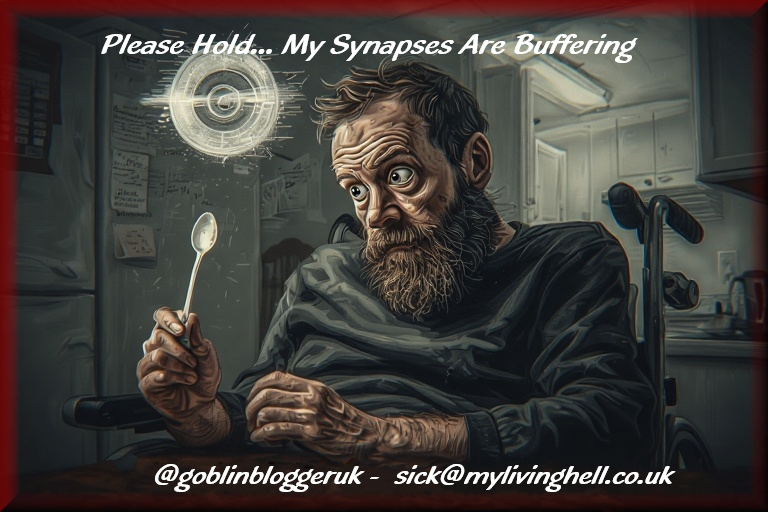- Posted on
⚠️ Please read with care: This blog shares personal, sometimes painful experiences. My intention is to support and speak honestly—not to harm. I’m not a professional, just someone who understands how hard it can get. If you're struggling, you're not alone—please reach out for help.
A Rude Little Guide for the Chronically Ill Who’ve Run Out of F00ks
You’ve tried patience. You’ve tried gratitude. Now try blasphemy—in biro and blood tests.
- Know More Than You Should Turn up with knowledge you shouldn’t have. Whisper about cytokines. Drop the word “iatrogenic” like it’s confetti. Watch their eyes dart.
“Oh, you didn’t read the 2023 update from NICE? That’s okay, I brought it for you… highlighted.”
Nothing scares a consultant more than a patient with a brain and a printer.
- Give Your Symptoms a Personality Don’t say fatigue. Say:
“It’s like my soul's buffering and the Wi-Fi's down.”
Don’t say pain. Say:
“Imagine being haunted by your own skeleton.”
You are not a walking checklist. You are a live performance of medical absurdism.
- Interrupt Their Monologue with Existential Questions They’ll be halfway through a condescending speech when you hit them with:
“Do you ever worry the NHS is a cursed machine fuelled by broken people?” “Are you happy? Like, truly happy?”
You’ve now become a threat and a philosophical detour. Excellent.
- Talk About Ghosts Mention you feel like there’s a Victorian child watching you when your medication wears off. Say things like:
“Ever since the lumbar puncture, I’ve seen colours I don’t think exist yet.”
They’ll stare. You stare back. You’ve established dominance.
- Be Cheerful at the Wrong Moments They’ll list terrifying potential diagnoses. You smile and go:
“Ooh, collect-the-whole-set vibes.” “I’m gonna need a loyalty card soon.”
No tears. Just gallows giggles. They hate that.
- Cry, But Like an Artist Don’t weep. Wail like a dying swan in a medical drama written by David Lynch. Tell them you cried into your cereal because the spoon reminded you of your body: bent, twisted, and slightly useless. Let them feel the poetry of your decline.
They’ll pretend to type. They’re actually Googling early retirement.
- Bring Props Bring a mood board. A poem. A sock puppet that represents your nervous system.
“This is Mr. Misfire. He twitches when I lie.”
Why? Because if you’re going to be treated like a freak, you might as well do it with props and panache.
- Question Their God Complex Ask questions like:
“Is it exhausting being right all the time?” “Do you ever think patients might know things you don’t?” “Do you believe in second opinions, or are you allergic to humility?”
You might be labelled “non-compliant.” Translation: self-aware.
- Say You’re Tired in Ways They Can’t Ignore Don’t just say “I’m tired.” Say:
“I feel like my blood was replaced with wet cement and bureaucracy.” “My body is on Windows 95 and every morning it fails to boot.”
They’ll try to convert this into ICD-10 code. They’ll fail. That’s the point.
- Tell Them You Don’t Want to Be Fixed They want a treatment plan. A fix. A conclusion. Instead, say:
“I’m not here to be solved. I’m here to be witnessed.” “You don’t have to cure me. Just see me.”
It’ll rattle the cage. It’s not in their manual. You just glitched the matrix.
☠️ Final Diagnosis: Terminal Authenticity You’re not a case. You’re not a referral. You’re the ghost in their machine, the poetry in their progress notes, the spoonie chaos that won’t be silenced.
So go in like a storm. Wear your pain like warpaint. And let them choke on the realisation that the most dangerous thing in their office… is a patient who knows who they are.
I write in ink and fury, in breath and broken bone.
Through storm and silence, I survive. That is the crime and the miracle.


